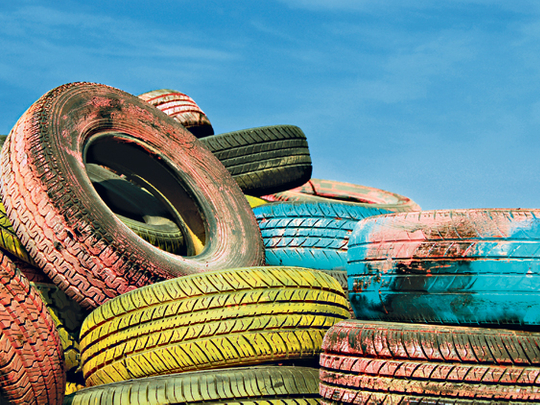
Your kid's education, dental care, legal advice and a safe car — quality matters for a few things in life. While opting for a fake DVD for example may be morally questionable, the worst thing it might do is affect your viewing pleasure. Opting for a fake set of wheels or car battery for the family van however, could well be the making of a complete nightmare.
On February 6 this year, police in Ajman seized Dh10 million worth of counterfeit car tyres bearing the marks of some of the world's biggest tyre brands. Officials of Michelin, a large tyre manufacturer, launched legal action against distributors around the world for selling fake products. They discovered that the practice is mostly prevalent in commercial operations involving trucks where there are pressures to keep costs down as petrol prices rise. It is this area where people must be careful. It's not common to be peddled fake parts for your Honda Civic, but if you're running a business involving large transport vehicles, some due diligence might be necessary.
Barring the odd police bust in trading zones, fake tyres and batteries aren't so prevalent an issue where you should be worried — but it is always best to err on the side of caution.
It is not a performance issue, but rather a safety one. This is what makes it more serious than that of other pirated products like phones or media. Rajesh Puthonveedu, Product Manager at the Tyres and Batteries Department at Al Majid Motors agrees. "Unlike other automobile spare parts, tyres are usually not faked. But I would point out a significance of ‘non GCC-specified' tyre specifications which are available through unauthorised parallel importers. Hence I would term the ‘fake/pirated' as ‘non-specified'."
He continues, "These are undoubtedly a grave concern keeping in mind the safety factor. Such tyres are prone to unprecedented service failures, such as ‘tyre bursts' causing unforeseen road accidents leading to loss of life or damage to vehicles, especially in GCC where the temperature tolerance is considered as the most important feature of a good performing tyre."
So how do we spot a fake? Puthonveedu offers some comprehensive advice concerning the matter. "As a layman's check, firstly make sure you are getting the most sought after brand which has an authorised distributor/dealer in the country. Always be aware of imitations of tread patterns of popular brands as for some customers tread pattern (design) is an alluring factor before purchasing the tyre. Secondly, obtain relevant invoices ensuring you of a warranty cover from an authorised distributor/dealer. Third, read the side wall of the tyre, ensuring the correct size spec as recommended by an authorised tyre distributor or dealer. Lastly, check for the freshness of the tyre based on the production date found on the side wall of the tyre."
Rules and regulations
Continuing with some insight is Muhammad Rizwan, Sales Manager at Zafco, a company specialising in car parts and maintenance. Rizwan provides the perspective of the regulators and manufacturers, revealing what can be expected by buyers from those making sure they don't come across fakes.
"The RTA doesn't pass any vehicle if they see tyres more than three years old. Furthermore, as far as industry standards are concerned, tyres are given a five-year warranty from date of production, and batteries also have specified time period. Always look at the serial numbers for both tyres and batteries."
The risks posed by batteries are not as pressing, though it could lead to you being stranded out in the middle of nowhere.
Hissam Khan, a banker and amateur rally driver living in Dubai is taken aback when asked the question. "Don't even think about it," he says sternly. "There is no point in taking a risk that large for a few hundred dirhams. The weather here causes a great deal of wear and tear on tyres and you will sometimes find yourself taking an exit and rounding a corner at more than 80 km/h. That's a recipe for utter disaster if you've bought dodgy tyres."












